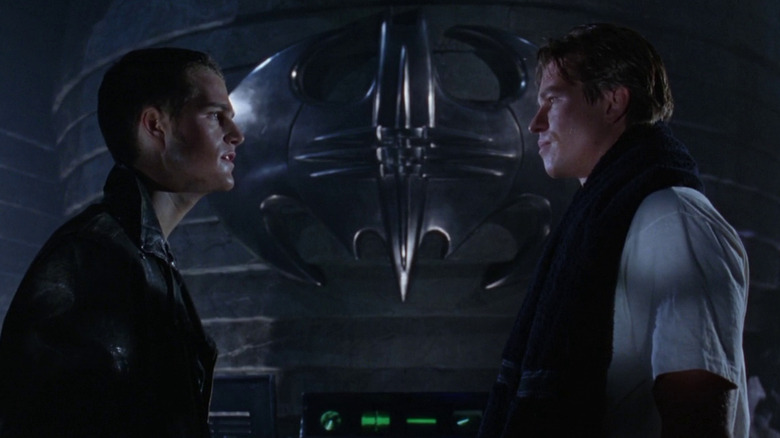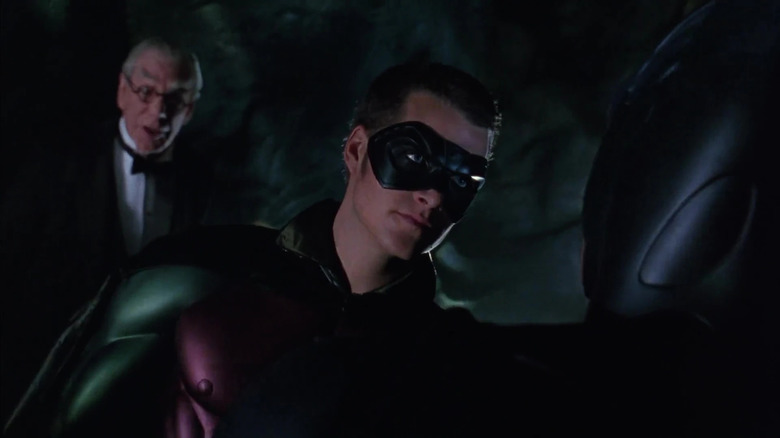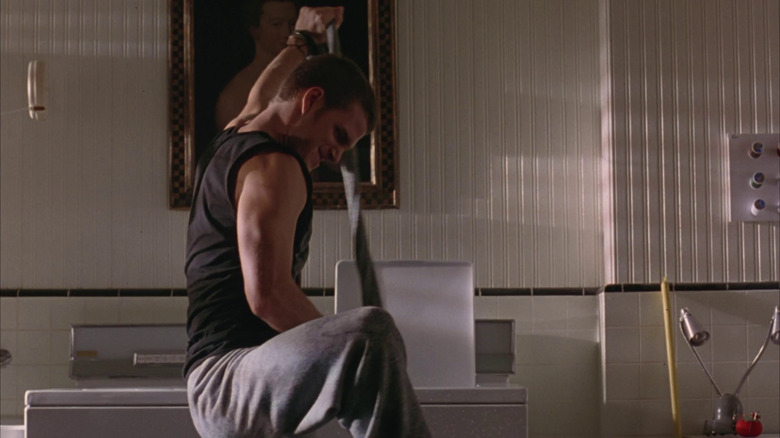Why Batman Forever Director Joel Schumacher Decided To Age Up Robin
Robin, the Boy Wonder was first introduced in the pages of Batman comic books in 1940, having been created by Bill Finger and Bob Kane. The character's domino mask and green-forward costume, as well as his name, were inspired by Robin Hood. In the myth of the comics, the young Dick Grayson was a mere eight years old and worked as a traveling circus performer with his family, aka The Flying Graysons. Dick's parents were murdered by a wicked gangster who had been extorting the circus owners. Orphaned, Dick was taken in by Bruce Wayne and trained in the art of crime-fighting.
As is the natural progression for a comic book character, Robin underwent multiple transformations and iterations over the decades. When Dick Grayson aged out of the role of Boy Wonder (he eventually became a superhero of his own named Nightwing), other younger people, usually teenagers, took on the mantle of Batman's brightly colored sidekick. There have, at last count, been at least a dozen additional Robins in DC comics.
Robin was famously played by Burt Ward in the excellent 1966 TV series "Batman." Ward was 20 or 21 when shooting began on "Batman," but that version of Robin was a teen, perhaps around 16. For many years, the public's perception of Batman and Robin was defined by the '66 series, leaving comic book purists — who preferred darker versions of the character — seething in canonical rage. Those of us who are attractive, fun people who are not sticks-in-the-mud, meanwhile, deeply appreciate the '66 series.
In Michael Singer's 1995 tome "Batman Forever: The Official Movie Book," the film's screenwriter Akiva Goldsman talked about how maligned Robin was historically, and how he and director Joel Schumacher wanted to transform the character into someone more adult and dignified.
Parallel tragedies
Akiva Goldsman wanted to go back to the original "parallel tragedies" of Batman and Robin. Both lost their parents at the hands of criminals, and both were moved to take up crime-fighting as a result. This was to stand in direct contrast to Burt Ward's pure-hearted rendition of the character who was so wholesome as to be comedic. It was also to make up for the various Robins who have been murdered over the years, notably Justin Todd, a Robin who was beaten to death with a crowbar. Goldsman said:
"Dick Grayson is really a very interesting character; one of the most maligned characters in the Batman series. Robin is killed over and over again in the comic books, in his various identities. But the truest and purest Robin, I think, will always be Dick Grayson. Here is a young man whose tragedy very clearly echoes young Bruce Wayne's, and again, we tried to make that emotional scenario more authentic to both characters while keeping the heightened comedy, drama and fun of the comic books."
Joel Schumacher's solution was to turn Robin from a boy wonder into a bitter young man of about 21. This was a Robin who already tooled around on a motorcycle and could drink in biker bars. Batman, then, wouldn't serve as a stand-in father figure for Robin, but more as an older brother. Besides, Batman's butler Alfted (Michael Gough) already filled the role of ersatz father. The brotherly dynamic would allow for a more bickersome relationship between the heroes, as well as place them more as equals.
Casting Robin
Joel Schumacher also had a bear of a time casting Robin. He wanted to make his version of the character, but rid him of any traditional Burt Ward-ian "innocent" affect. He also didn't want to fall into the trap of casting a junior actor as a "hip" character who teaches Batman hot '90s slang. Schumacher said:
"I didn't want to have an adolescent Robin. I didn't want to do a wide-eyed, cutesy, overly innocent Robin. Nor did I want an overly hip, street Robin. I wanted somebody that you believe is a young man of integrity, with vengeance on his mind, who would be a formidable foe with martial arts and acrobatic skills. And I wanted somebody you believe would be an acceptable partner for Batman, not some 'Holy Bat Mackerel' form of Robin."
Ward had some pretty wacky "Holy [blank]!" phrases (including "Holy Tintinnabulation," "Holy Rheostadt," and "Holy Priceless Collection of Etruscan Snoods"), but he never said "Holy Bat Mackerel." Regardless, Schumacher's point is taken. Ultimately, Schumacher cast the 24-year-old Chris O'Donnell ("School Ties," "Scent of a Woman," "The Three Musketeers") as Dick Grayson, and presented him as an accomplished acrobat and martial artist as well as a bitter post-college man. This Dick possessed the wherewithal to commit violence, but who was young enough to learn lessons about vengeance from a 35-year-old who had already been there (Val Kilmer, who played Batman, was around 35 at the time).
Of course, in 2023, it's been 28 years since "Batman Forever." For context, there are only 29 years between the 1966 TV series and "Batman Forever." Whether or not O'Donnell's Robin stuck in the mass consciousness, he has mutated several times over since then.


